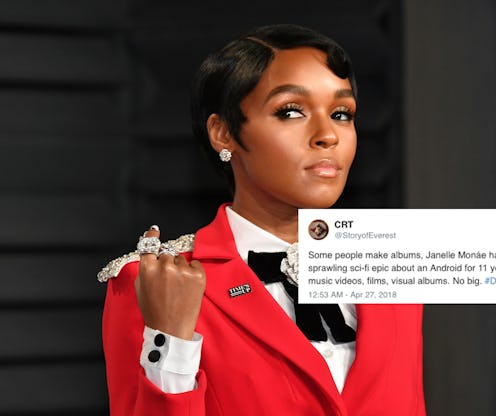Entertainment
This Fact About Janelle Monáe's New Album Will Leave Fans Even More In Awe

There's a lot in the running when it comes to deciding on the coolest part of Janelle Monáe's Dirty Computer short film and album, but one tweet in particular spells out just how impressive the artist's newest offering is. As user @StoryofEverest wrote on Friday, April 27, the day the album dropped:
"Janelle Monáe has been telling a sprawling sci-fi epic about an Android for 11 years, 4 records, music videos, films, visual albums. No big."
And "no big" is right. For others, maybe, but apparently not for Monáe. In an age of surprise album drops, visual albums, and multi-track storylines — here's looking at you, Beyoncé — it can be hard to stand out. But as this Twitter user points out, the "Make Me Feel" singer is playing in a whole different ballgame, and it's one that's all her own.
While the character Jane 57821 from Dirty Computer: An Emotion Picture is a new one, the world she inhabits is one that Monáe has been building out for years. And it suggests a long-arcing view of her career that highlights not only the Grammy nominee's business-savvy, but also her expansive artistic vision.
She knows who she is, and from the moment she figured it out, she's never wavered in sharing that self with the world. It started in 2007, with the 32-year-old's debut EP Metropolis: Suite I (The Chase). There, in the seven-track offering, listeners were introduced to a cyborg named Cindi Mayweather, Monáe's original android character. She even has a song called "Sincerely, Jane," a shoutout to the name she'd go on to incorporate into her 2018 android character years later.
It's either incredible foresight or a time machine, and at this point, you shouldn't put anything past her. Just like on Dirty Computer, the songs on Metropolis contain social commentary, and can even be read as a warning of things to come:
"The way we live, the way we die
What a tragedy, I'm so terrified
Daydreamers please wake up
We can't sleep no more"
It's a literal wakeup call, the same one echoed throughout Monáe's modern work. Describing the concept behind the Dirty Computer short film to Billboard this year, the Hidden Figures star actor said, "Overall, I wanted to reflect what’s happening in the streets right now, and what might happen tomorrow if we don't band together and fight for love."
It's the same message, over a decade apart, and nothing could be a better indicator of the artist's tenacity. Everything that she does — whether it's releasing music, starring in films, coming out publicly as pansexual, making a short film of her own, or really anything — is done with the goal of sharing her own voice and viewpoint.
And since that viewpoint is so clear, tracing it through history is truly a delight. After Metropolis' Cindi, who is still referenced in Monáe's Twitter bio, the singer moved on to her first studio release, 2010's The ArchAndroid. In a 2010 review, Pitchfork's Matthew Perpetua commended the album for covering genres from "R&B to rap, pastoral British folk, psych rock, disco, and more," and somehow making it sound like part of the same record. And the way she did that was to make the content congruous. The album is broken into two parts — suites — which follow that of Metropolis, continuing the story of Cindi, the god-like, Afrofuturist android who gives the album its name and its message.
But that wasn't the only part of this arc that the artist already had nailed down. Just take a look at this quote from that same Pitchfork article: "Monáe describes The ArchAndroid as an 'emotion picture,' an album with a story arc intended to be experienced in one sitting, like a movie." So eight years ago, the singer had already picked out the terminology for the short film she'd release in 2018, and was already thinking about the broader context of her work. Unbelievable.
The arc continues on Electric Lady, released three years later, which focused more on a single genre, but slipped right into Monáe Canon, if you will. As the "Tightrope" singer told Billboard in 2013:
"Science fiction is still very much a tool that I used. This still deals with Cindy [sic] Maywether, and she is the Electric Lady No. 1. A lot of this serves as a dual purpose of her life and mine combined throughout the album. I didn't quite know where I wanted to go in the story, so this is like the prequel to 'The ArchAndroid,' if you will."
Time has gone by, and Monáe's star has risen, but this is all the proof anyone should need that she's never lost sight of who she is. With every album that she releases, she pulls it a little closer and reveals a little more to her fans, and Dirty Computer is no exception.